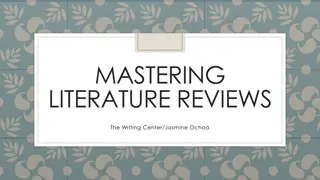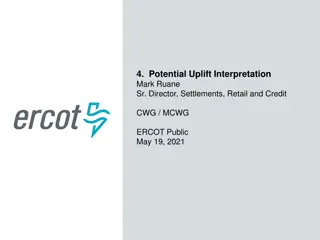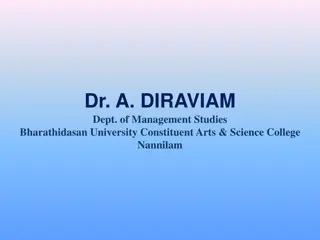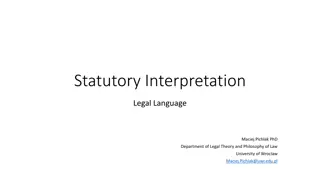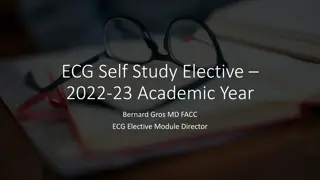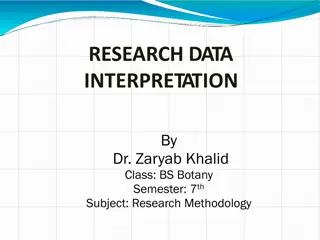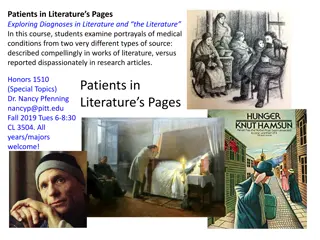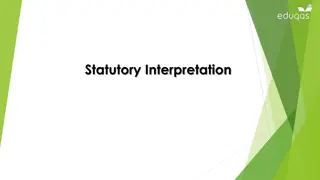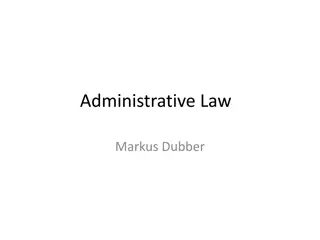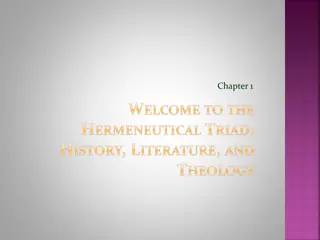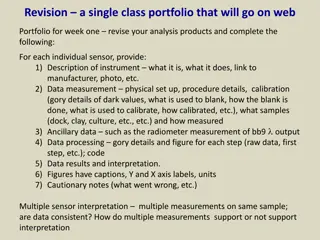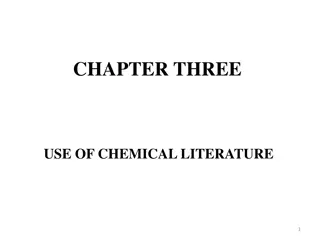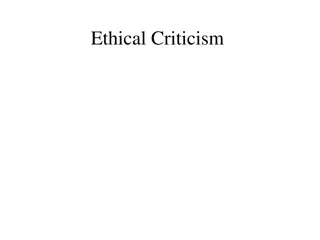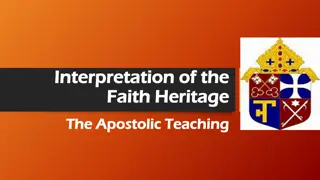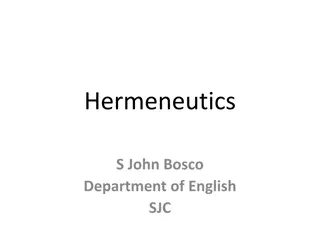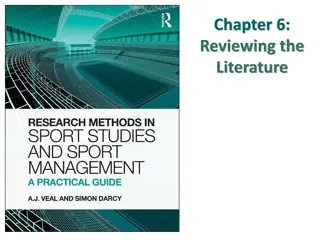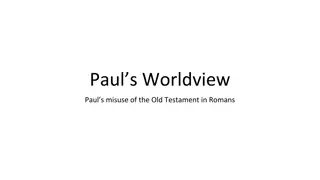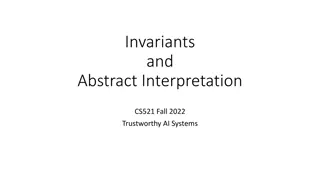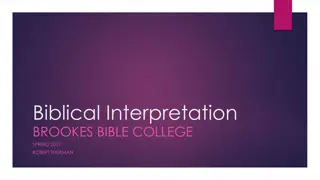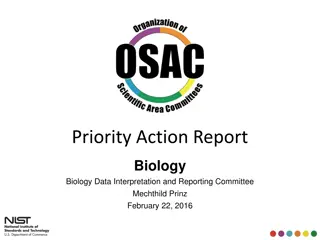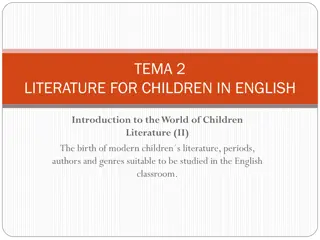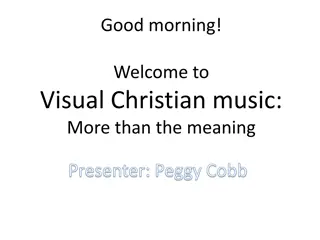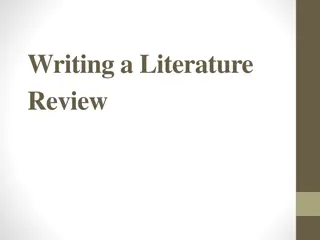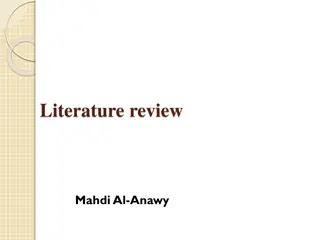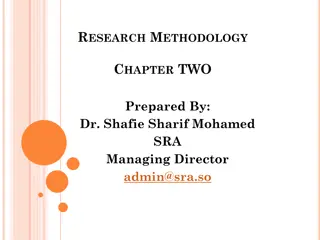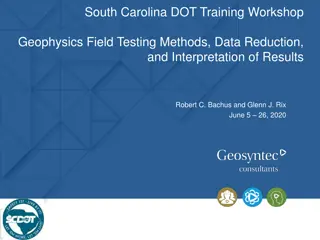Interpretation
Interpretation in research methodology involves drawing inferences from collected data, establishing continuity in research, and developing explanatory concepts for future studies. It helps researchers understand abstract principles, make predictions, and maintain research continuity. Interpretation
2 views • 5 slides
Mastering Literature Reviews: A Comprehensive Guide for Writing Success
A literature review is a critical discussion of relevant information on a specific topic, involving problem definition, interpretation, and identification of research gaps. It is not a mere collection of sources but a synthesis that guides further investigation. Incorporating APA style tips, this gu
1 views • 15 slides
Effective Strategies for Literature Searches and Re-Use of Scholarly Literature
Conducting literature searches involves surveying existing publications and information on a specific topic. Different search strategies, from simple searches to systematic queries and snowballing, are utilized based on research needs. Learning objectives include building search strategies, using ad
2 views • 19 slides
Introduction to Isixhosa Language and Literature - Exploring Characters and Themes
This content provides an overview of Isixhosa as a first additional language (FAL) and delves into key aspects of literature such as character development and themes. It discusses the importance of characters in storytelling, emphasizing the significance of round and flat characters. The article als
3 views • 28 slides
Understanding Potential Uplift Interpretation in ERCOT Protocols
ERCOT's Potential Uplift Interpretation Protocol defines Potential Uplift as the potential uplift to the Counter-Party based on short payments. The protocol outlines calculations and clarifies language ambiguity to ensure accurate interpretation. ERCOT seeks market feedback for further clarification
0 views • 6 slides
Understanding Literary Criticism: A Comprehensive Overview
Literary criticism involves the study, evaluation, and interpretation of literature, focusing on themes, styles, settings, and historical contexts. This discipline explores the meanings, workings, and values of literary works through interpretation, analysis, and evaluation. Various types of literar
2 views • 20 slides
Understanding Research Interpretation and Report Writing in Management Studies
Interpretation in research involves drawing inferences from collected facts to find broader meanings of findings. Techniques such as generalization, concept formulation, and consulting experts help ensure correct interpretation. Writing research reports is a crucial component, requiring logical anal
0 views • 25 slides
Comprehensive Literature Review Guidelines for Your Dissertation
Discover expert guidelines for conducting a thorough literature review in your dissertation. Explore topics such as literature search strategies, theoretical frameworks, review of the literature, synthesis, and analysis, with actionable tips provided throughout.
0 views • 11 slides
Understanding Statutory Interpretation in Legal Context
Explore the intricacies of statutory interpretation, linguistic and non-linguistic methods, and types of interpretation in legal contexts. Uncover the significance of legal reasoning, historical perspectives, and comparisons between Anglo-Saxon and Continental legal cultures. Delve into the complexi
1 views • 17 slides
Exploring the Significance of Persian Language and Literature in Indian History
Persian language and literature hold a crucial place in Indian history, serving as a prime source for understanding the medieval period. Scholars in India have dedicated their lives to preserving and promoting Persian history, language, and literature. The rich cultural heritage of India, dating bac
0 views • 9 slides
Mastering the Literature Review Process
Understanding the significance of literature review, this guide emphasizes the essential steps involved in conducting a successful literature review - from planning and research problem identification to critical analysis and contribution to existing literature. It explains the importance of develop
0 views • 16 slides
Clinical ECG Interpretation Elective: Learning Objectives and Activities
This rotation aims to enhance clinical skills in ECG interpretation with a focus on myocardial and conduction abnormalities, arrhythmias, and tachycardias. Students will engage in e-learning modules, case studies, and literature reviews to master ECG analysis. The course emphasizes patient care, med
0 views • 10 slides
Effective Strategies for Conducting Business Research Literature Review
This literature review provides insights into conducting business research effectively, covering topics such as how to search, read, and write literature reviews, along with the goals and types of literature. It emphasizes the importance of generating research ideas, demonstrating knowledge, and int
1 views • 13 slides
Research Data Interpretation
Principles and methods of data interpretation in research, transitioning from data to knowledge through analysis and inference. Importance of proper interpretation for drawing accurate conclusions and enhancing the value of research findings.
0 views • 33 slides
Exploring Diagnoses in Literature and the Literature
This course delves into portrayals of medical conditions in literature versus research articles. It explores the intersection of science and literature, analyzing works like "Black Swan Green" and "The Reason I Jump" to understand how they depict conditions like stuttering and autism. Through studen
1 views • 28 slides
Evolving Perspectives on Literature and Translation
Explore the intertwined relationship between national literature, comparative literature, and world literature, delving into the evolution of translation studies. Reflect on the shift from national literary histories to world histories of literature, highlighting the significance of world literature
3 views • 54 slides
Advanced Methods of Interpretation: Hermeneutics and Structuralism Lecture at Masaryk University
Understanding interpretation in cultural sociology through hermeneutics and structuralism is explored in Lecture III by Dr. Werner Binder at Masaryk University. The lecture delves into the art of interpretation, focusing on classical hermeneutics, Friedrich Schleiermacher's romantic hermeneutics, an
1 views • 37 slides
Understanding Statutory Interpretation: Rules, Approaches, and Challenges
Explore the concept of statutory interpretation, including the intention of Parliament, problems that can arise, various rules and approaches used in interpretation, aids and presumptions, criticisms, and the relationship between statutory interpretation, EU law, and precedent. The Literal Rule, a c
2 views • 26 slides
Understanding Three Approaches to Statutory Interpretation in Administrative Law
Explore the concepts of Ordinary Meaning, Context, and Three Approaches to Statutory Interpretation in Administrative Law through insightful discussions and relevant examples. Gain a deeper understanding of legal interpretation principles and their application in legal frameworks.
1 views • 14 slides
Exploring Biblical Interpretation: History, Literature, and Theology
Delve into the importance of skilled biblical interpretation, the cost of failed interpretation, and the essential characteristics of a biblical interpreter. Understand the significance of humility, the role of the Spirit, and the need for accuracy in handling the Word of God. Learn about the hermen
0 views • 23 slides
Comprehensive Sensor Portfolio Analysis for Data Interpretation
This portfolio revision focuses on providing detailed descriptions and analysis of individual sensors for data collection and interpretation. It includes information on instrument specifications, data measurement setups, ancillary data, data processing steps, results interpretation, and cautionary n
0 views • 5 slides
Understanding the Importance of Chemical Literature in Research
Reviewing chemical literature is essential in the research process to identify existing knowledge, develop hypotheses, plan methodologies, and discover unanswered questions. The vast and complex nature of chemical literature poses challenges in finding relevant information, especially with evolving
0 views • 22 slides
Exploring Ethical Criticism and Literature's Human Possibilities
Ethical criticism in literary studies revolves around the intersection of ethics, literature, and criticism. It tackles concerns about the relationship between value judgments, ethics, and aesthetics, emphasizing the importance of reconnecting criticism with moral principles. Literature offers a dee
0 views • 21 slides
Understanding the Role of Dogmas and Interpretation in Faith Heritage
The interpretation of faith heritage, apostolic teaching, and the role of dogmas in the Church form a foundation of belief that guides the spiritual journey. An authentic interpretation of God's Word is entrusted to the teaching office of the Church, emphasizing the connection between divine truths,
0 views • 9 slides
Understanding Hermeneutics: Exploring Interpretation and Meaning
Hermeneutics, a vital part of theology and philosophy, delves into understanding text and interpretation. Influenced by prominent thinkers like Heidegger and Ricoeur, it emphasizes the historical encounter and personal experience within the world. The concept of hermeneutical circle and the two area
0 views • 24 slides
Understanding the Importance of Literature Review in Research
Exploring the roles of literature in research, this content emphasizes the significance of reviewing existing literature to gather ideas, compare methodologies, and integrate supportive information. It also highlights the types of reviews and essential questions to consider during the literature rev
0 views • 12 slides
The Status of Literature in Secondary Schools of the O.E.C.S. - Research Findings by Dr. Anthony Felicien
Research by Dr. Anthony Felicien examines the status of literature in secondary schools of the O.E.C.S., focusing on the decline of interest in literature among students, influenced by historical curriculum changes and parental attitudes. The study highlights the importance of studying literature fo
0 views • 35 slides
The Interpretation of Messiah in Paul's Worldview
Paul's interpretation of the Old Testament in Romans is discussed regarding the portrayal of Jesus as Messiah. Scholars debate the alignment between the OT and NT perspectives on Messiah, exploring hermeneutics and biblical interpretation methods. The significance of understanding the Hebrew Bible's
0 views • 27 slides
Understanding Invariants and Abstract Interpretation in Trustworthy AI Systems
Invariants and Abstract Interpretation are crucial concepts in building trustworthy AI systems. This involves defining configurations, concrete semantics, set semantics, and handling programs with loops. Monotonic functions play a vital role in ensuring consistency in the interpretation of these sys
0 views • 22 slides
Importance of Proper Hermeneutics in Biblical Interpretation
Hermeneutics, the science of biblical interpretation, is crucial in understanding and applying the Word of God accurately. It involves rules and methods to determine the intended meaning of the text. Proper hermeneutics ensures correct belief, application, and interpretation of the Bible while avoid
0 views • 170 slides
Forensic Biology Data Interpretation Committee Overview
The Biological Data Interpretation and Reporting Committee focuses on establishing best practices, guidelines, and standards for forensic DNA laboratory interpretation. Their goal is to ensure quality and consistency in the forensic community by standardizing scientifically valid methods of interpre
0 views • 26 slides
Evolution of Children's Literature in English: From Alice to Modern Times
Explore the birth of modern children's literature starting with the publication of "Alice's Adventures in Wonderland" in 1865 by Charles Dodgson (Lewis Carrol), marking a shift towards entertaining and engaging literature specifically for children. Prior to this, children mainly read folklore and ad
0 views • 35 slides
Workshop on Visual Christian Music Interpretation with Peggy Cobb
This workshop delves into the art of interpreting music visually, focusing on incorporating styles, rhythms, and presentation elements to convey the essence of a song in American Sign Language. Participants will explore modern and hymnal Christian music genres, alongside pop and country songs, to en
0 views • 15 slides
Mastering the Art of Writing Literature Reviews
Understanding the essence of a literature review, its descriptive and analytical components, selecting key articles, and finding relevant sources are essential steps in crafting a comprehensive literature review. By integrating ideas from various sources and highlighting crucial findings, a literatu
0 views • 18 slides
Comprehensive Guide to Literature Review Process
A literature review is essential before conducting research to identify existing information, gaps in literature, major works, and relationships between studies and theories. Follow steps such as defining the topic, sourcing information, discussing findings, and drafting to write an effective litera
0 views • 8 slides
Effective Strategies for Conducting a Literature Review in Research Methodology
Understanding the importance of literature review in research methodology, this chapter discusses the objectives, aims, and guidelines for writing a comprehensive literature review. It emphasizes the significance of identifying gaps in existing knowledge, structuring the review, and organizing infor
0 views • 33 slides
GCSE English Language and Literature Overview
GCSE English Language and Literature subjects are led by Mrs. A. Baker and Mr. Doodson. English Language is examined by OCR, while English Literature is examined by Edexcel. Both subjects have two examination papers worth 100% of the grade. English Language papers focus on reading and writing skills
0 views • 14 slides
Anzald.a's Borderlands Interpretation Workshop: Group Study & Analysis
Explore Anzald.a's text through group activities, discussions, and interpretation methods focusing on key concepts such as borderlands, mythologies, psychology, and literature. Understand the importance of reader-response in deciphering the implied relationships and implications within the montage o
0 views • 34 slides
Unlocking the Power of Single Word Analysis in Literary Interpretation
Enhance your analytical skills with step-by-step guidance on dissecting quotes, understanding connotations, identifying literary techniques, and exploring deeper meanings in texts. Delve into the glory of single words to elevate your understanding and interpretation of literature.
0 views • 4 slides
Geophysics Field Testing Workshop: Methods and Interpretation
South Carolina DOT Training Workshop on geophysics field testing methods, data reduction, and interpretation of results by Robert C. Bachus and Glenn J. Rix. The workshop covers suspension logging, borehole geophysical logging, geotechnical testing, and geophysical service companies such as Schlumbe
0 views • 11 slides

